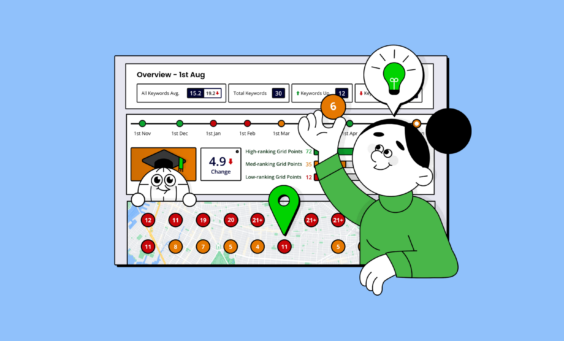This article is from our Agency Growth Handbook—a collection of guides created to help local SEO agencies grow and succeed. It is chapter four of ‘Part One: Pitching and Onboarding’.
Picture this: you’re walking home from the store, grocery bags in hand, thinking about what you’re going to put on the TV when you arrive. Then, you notice it. Across the street, there’s a huge sign screaming, “Now open.”
Another gym in your neighborhood? The gears in your head start turning as you pick up your pace. You are now on a mission to help businesses in your community thrive online. As an expert, you know local SEO is the answer, and your agency is after more clients. Now, you only have to convince them.
Pitching Checklist
- Research your potential client’s business, industry, target audience, and main competitors.
- Audit the current state of your potential client’s local SEO, website, and online listings.
- Identify opportunities for local SEO improvement.
- Set realistic expectations.
- Send a personalized local SEO proposal.
How to Find Prospects
Finding opportunities while walking down the street is great, but you can’t always rely on accidents to find new prospects. What you can rely on are specialized tools that help you identify and pitch to potential clients. Tools like BrightLocal help you see which local businesses could benefit from better SEO and create a convincing pitch.
Local Search Grid
Once you’ve picked your target area, go to Local Search Grid to discover businesses that could use local SEO improvements. Since we’re looking at local gyms, put in a few common keywords a gym would use and generate a report. What you’ll see is a visual representation of rankings by keyword for the location you’ve chosen.
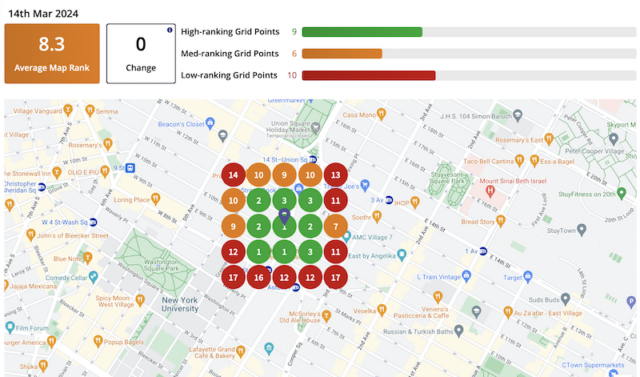
Besides giving you a quick overview of local business rankings, this visual can help you pitch your local SEO services. Your prospect might not understand the ins and outs of SEO like you do. But seeing what their local search rankings look like in a grid compared to similar local businesses is a great starting point for convincing them.
Local Rank Tracker
Once you’ve found a local business you want to pitch to, you’ll want to see how well their website is doing in the entire city. For this, run a report through Local Rank Tracker to take a look at your prospect’s average ranking position and keyword movement.
![]()
Additionally, you can add your potential client’s competitors to this report to get a comparison and identify gaps. This lets you tailor your approach when reaching out to prospects and helps them visualize the state of their online visibility.
Citation Tracker
Last but not least, BrightLocal’s Citation Tracker is a useful tool for citation building. You get an overview of inconsistent and missing online listings, and all you need to do is explain to your prospective client why this is a problem.
![]()
Besides seeing opportunities, BrightLocal also shows you the citation value and authority. That way, you can pinpoint high-potential listings and give your prospects a fully transparent game plan.
What is a local SEO proposal?
A local SEO proposal is a document outlining your plan to improve a business’s online visibility within a specific geographic location. It serves as a roadmap for implementing tailored SEO strategies to boost a company’s presence in local search results.
When done right, a local SEO proposal tells the client exactly how and when they can expect better results. What’s more, it needs to show the client why better search results benefit their business.
That said, like any other proposal, your local SEO proposal should be clear, concise, and to the point. Here’s what to include and how to present your services in a manner your clients understand.
Try a free SEO Proposal Template
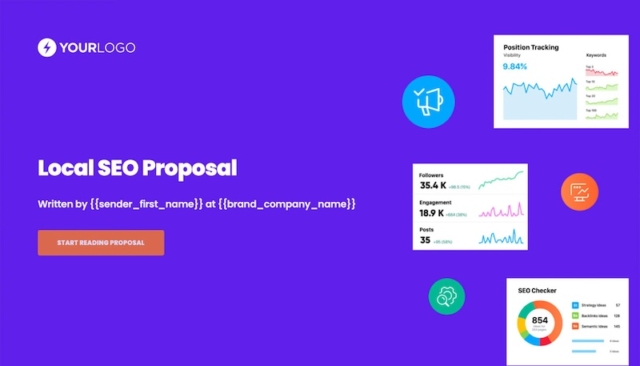
Better Proposals has put together a local SEO pitching template. Just follow this link for a completely customizable local SEO proposal template.
What to Include in Your Local SEO Proposal
Before you start crafting a local SEO proposal, there’s a lot of research you’ll need to do. You want to show the client that their online presence could use improvement and that you’re the right person for the job.
Naturally, you’ll include detailed keyword research and list all the technical SEO issues. You’ll talk about their domain authority, on-page optimization, and missing meta descriptions, right? Wrong.
While all the technical information is crucial for you to create a local SEO strategy, your clients only care about the benefits. They’ll either scroll past your detailed reports or ignore your proposal altogether.
An effective proposal is always short and simple. If a potential client needs a crash course in search engine optimization to understand it, they won’t sign.
1. Start With a Convincing Executive Summary
Research shows that the executive summary and pricing are two of the most read sections in all business proposals. Since it’s the first thing your potential client will read, you need to make it short and convincing.
A great executive summary shows the client two things: you understand their problem, and you know how to solve it. This part of your local SEO proposal should be all about the client and the solution. To get potential clients hooked right off the bat and write an effective SEO proposal, you need to include:
- Your understanding of the client’s pain points (e.g., not enough leads and how it impacts their business)
- Your solution and how it will help your client reach their business goals
- Reassurance that you are the right choice for the job
What this looks like in practice depends on the type of business your potential client is running. For the sake of giving an example, let’s say you were pitching to the local gym mentioned earlier. In this case, your executive summary could look something like this:
Become Union Square’s go-to local gym
At [gym name], you’re not just about hitting the treadmill or lifting weights. You’re about empowering your neighbors to lead healthier, happier lives.
However, to make these goals a reality, you first need to connect with the members of your community. Handing out flyers and relying on word of mouth only gets you so far. To expand your reach and let more people get to know your business, you need a strong online presence.
Currently, you’re the first fitness choice on your block, which is proof of the quality of service you offer. Unfortunately, people living only two blocks away won’t be able to find you through major search engines.
Together, we could strengthen your online presence, amplify your message, and inspire even more people to join you on the journey to health and wellness. Our local SEO strategy laid out in this proposal aims to showcase the offerings and warm atmosphere that make [gym name] unique. Read on to see how our services can help in making [gym name] the ultimate fitness choice in Union Square.
2. Outline the Local SEO Strategy
Now that your potential client is interested in your SEO services, it’s time to bring on the details of your offer. You want your prospect to understand how your solutions work.
For example, if you’re offering to improve their Google Business Profile, include why it’s important. If you think they would benefit from keyword optimization across their website, let them know what end results to expect.
The basic idea is to be as detailed as possible. That way, both you and your client have this section to refer to in case you come to a disagreement in the future.
Note that the most important thing here is to keep things in plain English. Stay away from industry jargon because it will only confuse your client.
3. Set a Realistic Timeline
Besides knowing what you plan on doing and why, your clients are also interested in how long it will take. Keep in mind that this is your project timeline, not the time it will take for the SEO changes to kick in.
Let’s say that your project includes content creation. Your project timeline should then display how long it will take to create the content, not how long it will take the content to perform. Similarly, you can present Google Business Profile management as an ongoing service with a set amount of hours per month.
While this section of your local SEO proposal is all about being as specific as possible, you can also use it to your advantage. Giving yourself more time to deliver means you have more time to fix unexpected problems.
And, if none of those appear, then you’re finishing earlier than promised and impressing your client. It’s a win-win situation.
Presenting Your Strategy and Timescales
The SEO strategy you came up with and the timeframe in which you will execute it don’t need to be two separate sections in your proposal. Instead, you can outline the SEO strategy in a few separate steps that each have their own timeline.
Some agencies have strict onboarding processes in place, to help make it easier and more transparent, and sharing that alongside the projected roadmap is a good idea. It’s worth highlighting that all of the auditing hasn’t been done at this stage, and that the work done for your proposal is simply scratching the surface.
For example, laying out the first few weeks or months could look something like this:
Step 1: Keyword research
Timeline: 1 week
We will have a call to help us understand the products and services you offer on a deeper level than right now. We’ll then produce an action list and break it down into months. This plan will be structured to get you results as fast as possible.
Step 2: Quick wins
Timeline: 2-4 weeks
Your website has been online for [time], which means you’re already naturally ranking for a few keywords here and there. Initially, our job is to do a set of quick fixes so you can see results coming in.
You don’t currently have a Google Business Profile, which is also something we’ll set you up with. Besides helping you look more professional, this will also make you visible on Google Maps and show your business to potential customers in your area in Google Search.
Step 3: The ultimate plan
Timeline: 2-6 months
The end game is becoming the ultimate fitness choice in Union Square. Getting on this level of lead generation is simply to be everywhere.
Whatever combination of words people type in—boom, you’re there. Whichever online listing they’re looking at, [gym name] is mentioned. Now, this isn’t easy and it takes time, but giving you that extra boost in leads will go a long way towards taking over your local space in Google.
4. Include Testimonials or a Case Study
Every time you send a business proposal, what you’re really doing is asking a potential client to spend money. Naturally, they’ll want proof you can deliver on your promises before they invest in your solution.
Your local SEO proposal should always have social proof because there’s no better way of getting a new client on board than other happy clients. This could be testimonials, a written case study, video case studies, or screenshots. It doesn’t have to be complex, but it does need to get the point across.
A strong local SEO case study can be a powerful tool to help you convert new clients, especially if you can show success doing the tasks you’re pitching or in the industry the client sits in.
5. Make Your Pricing Easy to Understand
Your pricing section is the worst place to confuse potential clients. Even if the rest of your local SEO proposal is perfect, getting the pricing wrong is a surefire way to lose the deal.
The first thing you have to do is make your pricing clear and transparent. Whether you’re charging a project fee, an ongoing rate, or by the hour, you need to make that clear to the client.
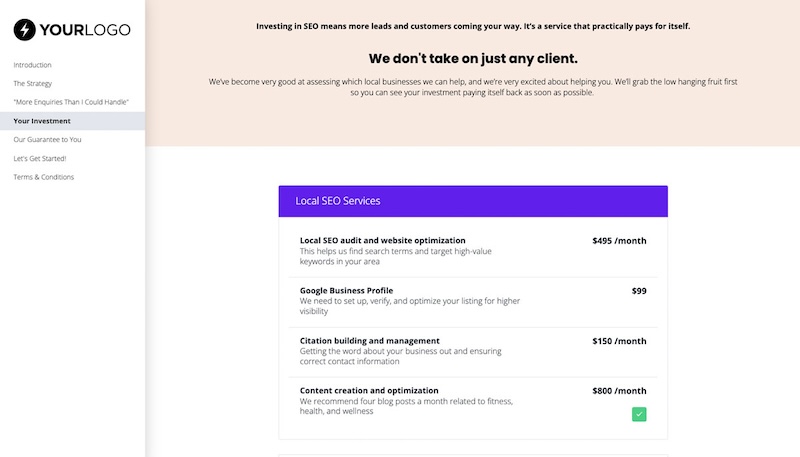
If you use a combination of different pricing strategies, make sure that it’s clear from your pricing table. Itemize your services and include descriptions in everyday language so your client knows what they’re paying for.
Another thing to look out for is how you try to upsell. While modern, like Better Proposals, comes with interactive pricing tables that let you add options, don’t go overboard. A business proposal is a matter of getting a yes or a no from a potential client. The more options you add, the harder it gets to say yes.
6. Tell Potential Clients What the Next Steps Are
Don’t forget to let potential clients know how to move forward with your local SEO proposal. What do they need to do to accept? Do they email you, call you, sign the proposal digitally?
Whatever it is, include a small section to let them know instead of having to figure it out. It makes you easier to buy from and creates a better customer experience.
This section doesn’t have to be complex or particularly well-worded. A numbered list with clear instructions will do. For example:
- To proceed with our local SEO services, please sign by typing your name into the box below.
- Upon signing, you’ll be taken to a payment screen for our 30% advance fee.
- Once we’ve received your payment, we’ll get in touch to arrange an initial consultation call.
- At this point, we will also share any onboarding documentation we need you to complete.
7. Don’t Forget the Terms and Conditions
If you’re using digital signature software, definitely include your terms and conditions. That way, once the client has signed your local SEO proposal, they’ve also signed a contract. Besides getting all your bases covered, this also eliminates the need for a separate contract signing.
Bonus tip: Give Them a Guarantee
A guarantee is a great way to get new clients on board fast. To make your local SEO proposal even more tempting, consider adding one to your pricing section.
While a money-back guarantee might be the first thing to come to mind, you can also guarantee additional services. For example, you could offer additional ads if the ones included in your initial proposal don’t result in an X number of new customers for your client.
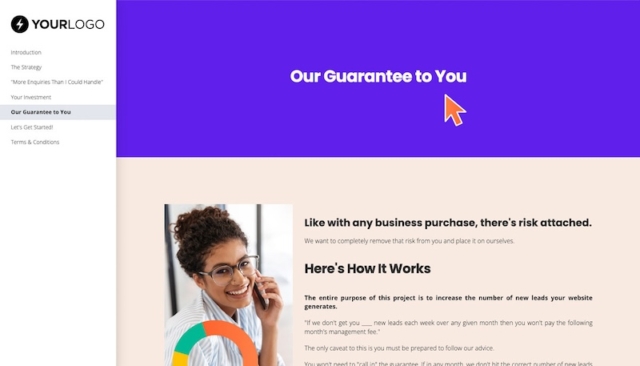
7 Tips for Better Pitches
When putting together your next local SEO proposal, keep the following tips in mind for better pitches:
- Personalize your approach by addressing the prospect’s specific challenges.
- Clearly outline the scope of work and measurable goals.
- Showcase past successes or case studies to demonstrate your expertise.
- Provide transparent pricing and timelines.
- Follow up with prospects after sending the proposal to answer any questions or concerns.
- Create a proposal template or find a free template online so you don’t have to create a proposal from scratch every time.
- Stay away from industry jargon. The less prospective clients understand, the less likely they are to move forward with a project.
Final Thoughts
Creating a successful local SEO proposal is not just about showcasing your skills. It’s about understanding the unique needs of each potential client.
Local SEO tools, like BrightLocal, can help you gather powerful data that helps you create proposals addressing specific pain points. Get clients hooked with a persuasive intro, present clear deliverables, and stay away from industry jargon.
And if you want to increase your chances of winning new business even more, include a guarantee. Showing that you put that level of trust in your services only makes clients want to sign on faster.

